This was a weekend of independence.
*As such, my blog posting was limited. But today, to round out the holiday, I will devote myself to minicomics - those most independent of comics for this most independent of times, provided you are currently within the United States of America and aren't going to be difficult about the exact dates of American declarations of independence. I don't need difficulty right now. I saw WALL-E yesterday, and the shopping mall in space really inspired me, ok?
***
MINIATURE COMICS EXTRAVAGANZA #1
(EDIT 9:40 PM: added pics & corrected credits to Together Forever)
***
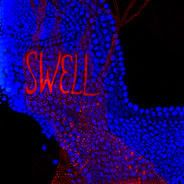
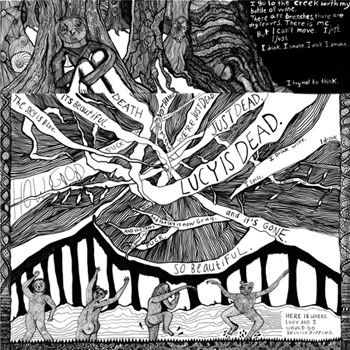
Swell, Part One (of Three): Openfaced Sandwich (Juliacks; 20 pgs, $2.00): And, as it often goes with so widely-applied a label, this first 'mini'comic is actually an 11" x 11" square of comics. As such, page samples lose something reduced to the piddling dimensions of this site, and it's fruitless to display mere details since every page is quite carefully constructed as a standalone design unit. I recommend you check out larger images at the book's webpage, for maximum acquaintance.
This is impressive, dense stuff, its narrative bounding around in time -- back and forth, then indistinctly forward, page-by-page -- and shifting in and out of a primary character's consciousness, events sometimes observed and sometimes felt. Generally, it's the story of young Emmeline, whose sister Lucy dies while she's away at university. In execution, it's an account of reminisce and supposition swirling with grief, as time continues to stagger indistinctly forward. Juliacks works in mark-heavy, sometimes geometrically arranged displays that recall Mark Beyer's Amy and Jordan strips, albeit far less controlled in tone and apt enough to shatter into tiny story bits that moment-to-moment reading occasionally becomes a challenge.
Still, there's a firm grasp of pace behind this, long horizontal strips of narrative on one page giving way on the next to those twisted roots of sadness as (barely) seen above. The artist's visual world deliberately struggles to pull itself into a restrained schema as its main character tries to set her emotional state in order, but it's all futile for part one. I'll like to see how it progresses.
***
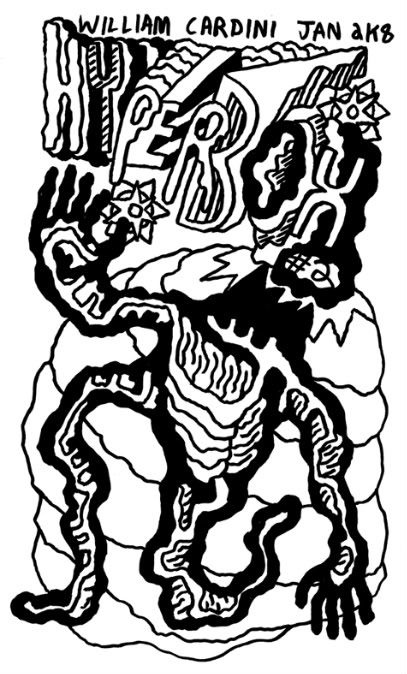
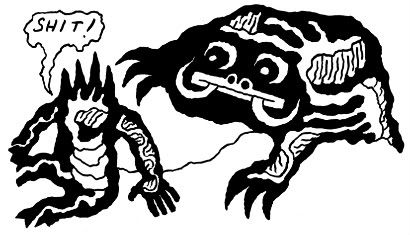
Hyperbox #2-3 (William Cardini; 20 pgs per, $3.00 per): Meanwhile, other one-world-per-page realities contort on their own. I like Cardini's simple minis, devout to mutation and shifting alien landscapes, words becoming scenery, people losing distinction, etc. Issue #2 sees series protagonist Mark -- lost in the Hyperrealm! -- unable to control his bodily transformations and eventually eaten by a nasty Lizzard. The reader's perspective tips to the side then rights itself again, mostly zooming in and out of the scene so as preserve the consistency of Our Hero's eventual crystallization.
Issue #3 begins to suggest a larger cosmic saga, as the series' technical limitations begin to hamper it a little - one double-page spread in particular is rendered nearly inchoate by an extra-large center gutter. But I find it all very joyful, just delighted to simply be on paper, and it's infectious in that way.
***
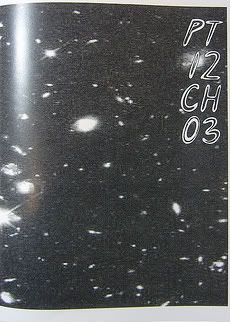
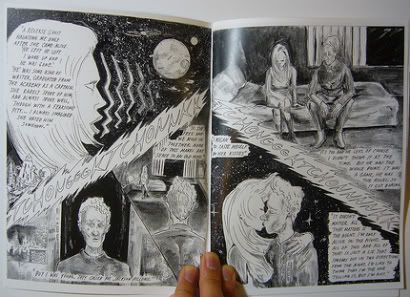
Part 12 Chapter 3 of "Together Forever" (Stephen Hirsch & Connie Su; 20 pgs, $1.50): This comic, on the other hand, seems to adopt sci-fi tropes primarily as metaphors for romantic and sexual anxiety, just as its 'serial' nature appears to function as a very self-contained expression for its narrator's lingering (if not immediately perceptible) doubts.
Jackson Pillows and another man are working on some sort of crew outside of a gleaming city, their present-day activities constrained to tiny panels. But Pillows isn't one to keep his mouth shut, ever, so he regales us with a full-bleed flashback to a time at the Academy when he had sex with a woman on the rebound. Her skin goes translucent, Pillows' masturbatory nature is revealed in a mole on her breast, and a spunk monster rises from the toilet in ejaculatory triumph as Our Hero's franker doppelgänger.
It's a notably self-critical piece, in that its narrator's expected anxiousness with his romantic life is disbursed to everywhere but his proper narration. It's best taken as transplanted into the book's visual construction, with a TCHONGGGKCHONNKK sound effect originating in the icy 'present' pages and literally cutting through all of the flashback, although Hirsch is more prone to have his talkative character recite enough information so that Su's visuals might more directly undercut (or perhaps complicate) his quizzical musings on this woman Pillows is so attached to. Regardless, its value as a short story is in its application of the comics form; there is some inspiration in there.
***
MINIATURE COMICS EXTRAVAGANZA #1
(EDIT 9:40 PM: added pics & corrected credits to Together Forever)
***


Swell, Part One (of Three): Openfaced Sandwich (Juliacks; 20 pgs, $2.00): And, as it often goes with so widely-applied a label, this first 'mini'comic is actually an 11" x 11" square of comics. As such, page samples lose something reduced to the piddling dimensions of this site, and it's fruitless to display mere details since every page is quite carefully constructed as a standalone design unit. I recommend you check out larger images at the book's webpage, for maximum acquaintance.
This is impressive, dense stuff, its narrative bounding around in time -- back and forth, then indistinctly forward, page-by-page -- and shifting in and out of a primary character's consciousness, events sometimes observed and sometimes felt. Generally, it's the story of young Emmeline, whose sister Lucy dies while she's away at university. In execution, it's an account of reminisce and supposition swirling with grief, as time continues to stagger indistinctly forward. Juliacks works in mark-heavy, sometimes geometrically arranged displays that recall Mark Beyer's Amy and Jordan strips, albeit far less controlled in tone and apt enough to shatter into tiny story bits that moment-to-moment reading occasionally becomes a challenge.
Still, there's a firm grasp of pace behind this, long horizontal strips of narrative on one page giving way on the next to those twisted roots of sadness as (barely) seen above. The artist's visual world deliberately struggles to pull itself into a restrained schema as its main character tries to set her emotional state in order, but it's all futile for part one. I'll like to see how it progresses.
***


Hyperbox #2-3 (William Cardini; 20 pgs per, $3.00 per): Meanwhile, other one-world-per-page realities contort on their own. I like Cardini's simple minis, devout to mutation and shifting alien landscapes, words becoming scenery, people losing distinction, etc. Issue #2 sees series protagonist Mark -- lost in the Hyperrealm! -- unable to control his bodily transformations and eventually eaten by a nasty Lizzard. The reader's perspective tips to the side then rights itself again, mostly zooming in and out of the scene so as preserve the consistency of Our Hero's eventual crystallization.
Issue #3 begins to suggest a larger cosmic saga, as the series' technical limitations begin to hamper it a little - one double-page spread in particular is rendered nearly inchoate by an extra-large center gutter. But I find it all very joyful, just delighted to simply be on paper, and it's infectious in that way.
***


Part 12 Chapter 3 of "Together Forever" (Stephen Hirsch & Connie Su; 20 pgs, $1.50): This comic, on the other hand, seems to adopt sci-fi tropes primarily as metaphors for romantic and sexual anxiety, just as its 'serial' nature appears to function as a very self-contained expression for its narrator's lingering (if not immediately perceptible) doubts.
Jackson Pillows and another man are working on some sort of crew outside of a gleaming city, their present-day activities constrained to tiny panels. But Pillows isn't one to keep his mouth shut, ever, so he regales us with a full-bleed flashback to a time at the Academy when he had sex with a woman on the rebound. Her skin goes translucent, Pillows' masturbatory nature is revealed in a mole on her breast, and a spunk monster rises from the toilet in ejaculatory triumph as Our Hero's franker doppelgänger.
It's a notably self-critical piece, in that its narrator's expected anxiousness with his romantic life is disbursed to everywhere but his proper narration. It's best taken as transplanted into the book's visual construction, with a TCHONGGGKCHONNKK sound effect originating in the icy 'present' pages and literally cutting through all of the flashback, although Hirsch is more prone to have his talkative character recite enough information so that Su's visuals might more directly undercut (or perhaps complicate) his quizzical musings on this woman Pillows is so attached to. Regardless, its value as a short story is in its application of the comics form; there is some inspiration in there.
Labels: Minicomic Extra

<< Home